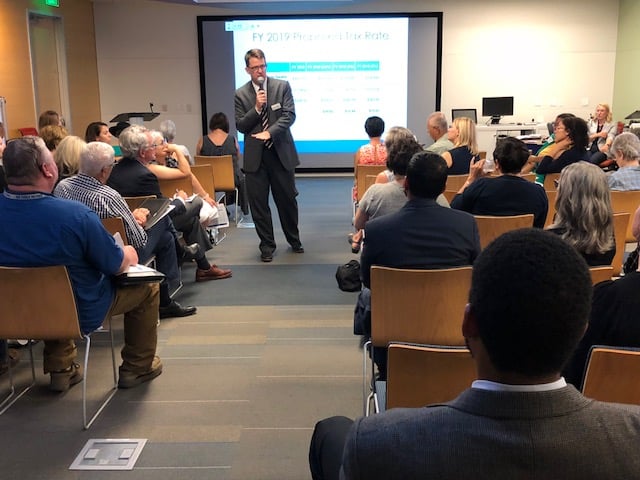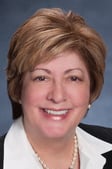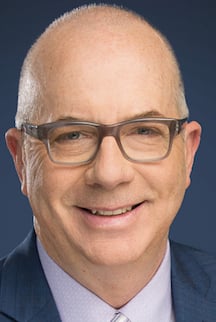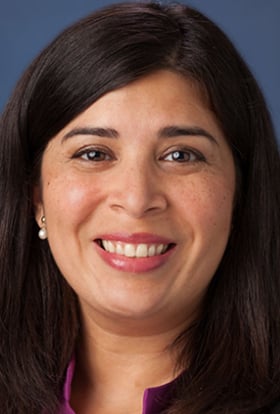Live audience interacts with slide show, answers questions via electronic polling
Part 9 in a Series
Updated Monday August 6, 2018 4:02pm to include links to complete an online survey through August 20.

Mike Geeslin, president and CEO of Central Health, the agency that levies property taxes to pay for indigent healthcare services, led what amounted to a two-hour focus group Tuesday night at its East Austin headquarters.
A side table was stacked with food. Extra chairs were added as the crowd swelled to more than 50 people who came to hear and interact in what Central Health billed as a Community Conversation.
The purpose was to gather feedback on Central Health’s proposed 2019 budget of $238.4 million, which would pay for a wide range of medical services for low-income Travis County residents. The budget will be posted for discussion and adoption by its Board of Managers September 12 and the Travis County Commissioners Court September 18.
The proposed 2019 budget is based on a tax rate of 10.3742 cents per $100 property valuation. Based on an average taxable homestead value of $326,895, that levy would result in a tax bill of $339.13. That’s an increase of $10.82 more than was paid on an average home value of $305,719 in 2018.
A chart included in the budget package indicates that in FY 2018, Austin ISD collected 55.5 percent of all property taxes in Travis County, the City of Austin 20.5 percent, Travis County 14.8 percent, Austin Community College 5 percent, and Central Health 4.3 percent.
Poll questions draw feedback

Geeslin asked for interaction and got it as attendees participated in answering a poll of 11 questions, using electronic devices (see photo, right). Each question was introduced by a staff member to add a bit of context before votes were cast. All questions were multiple choice, with five options for all but one.
While the audience reactions to the questions were important, it must be noted that the people attending were almost exclusively either healthcare providers or community advocates for healthcare services (more about that later).
That said, most of the questions were straightforward and resulted in responses that were clear cut and nearly unanimous. To the question should healthcare services be expanded, for example, one person was neutral, seven answered “somewhat” and 29 “to a great extent.”
All but one answered “to a great extent” that Central Health should “ensure everyone who needs healthcare can get it.”
Perhaps the most important question was saved for last: “Is the amount you pay in property taxes to support health care in Travis County too much, too little, or about right?” Of the 36 votes cast by attendees, a surprising 11 answered “too little” (31 percent), 8 answered “too much” (22 percent), and 17 answered taxes were “about right” (47 percent).
If you’re interested in reviewing all the poll questions and resulting responses, they are listed starting on page 7 of the PDF titled Community Conversation: The 2019 Budget, linked below. (Results of the polling among audience members were annotated, in red print, by The Austin Bulldog.)
Even if you didn’t attend the budget Community Conversation, Central Health would like to have your input by completing a survey no later than August 20. Go here to read the introduction and click on Complete the Survey. Central Health will also be using a version of the survey to conduct interviews with current and potential patients in community clinics, community organizations, and at outreach events.
Striving to boost services
Geeslin said that Central Health “has provided care for more than 135,000 people since 2012.” That care is delivered through other providers and paid for my Central Health, which Geeslin said has “probably 200 contracts in Travis County.”
A map included in the Community Conversation package shows that almost every area of Travis County east of I-35 has either a high or moderate concentration of families living in poverty. Those areas are targeted for future clinic locations.
Those long-term plans, however, do not satisfy critics, particularly those in the Del Valle area that surrounds the Austin Bergstrom International Airport and includes the communities of Creedmoor, Elroy, Garfield, Hornsby Bend, Mustang Ridge, and Webberville.

Ann Heuberger, vice president of Del Valle ISD’s board of trustees, injected numerous questions related to the lack of healthcare services for residents in that part of the county.
Because Del Valle is not a city, Del Valle ISD’s board of trustees oversee the only government agency in the area and has been in the forefront on this issue. In fact, Rebecca Birch, president of the board of trustees, is the lead plaintiff in a lawsuit filed against Central Health last October. (Birch was not present at this meeting.)
The lawsuit (Birch et al v. Travis County Healthcare District dba Central Health and Mike Geeslin, in his official capacity only, Cause No. D-1-GN-17-005824) claims it not legal for Central Health to give $35 million a year to the University of Texas at Austin Dell Medical School. That lawsuit seeks an injunction to stop Central Health from spending money on anything not related to furnishing medical aid and hospital care to indigent and financially needy residents of Travis County. The litigation is currently in the discovery phase. (For details, see Lawsuit Challenges Central Health Spending.)
“What’s the timeline on expanding services in Travis County where none have existed for 12 years?” Heuberger said.
Geeslin said, “I’m not aware of an expansion. We opened a clinic by the airport two days a week with extended hours.” He said the agency was working to secure another space as a short-term solution. For the long-term, plans call for building a facility. Potential locations are being looked at. “I wish I could give you a timeline. It’s something we’re pushing on.”
Heuberger replied, “Our community has been waiting 12 years, paying taxes for 12 years and getting zero services.”
Geeslin said that “thousands of eastern Travis County residents” were receiving services, “but not at convenient locations.”
Heuberger said she would urge the Commissioners Court not to approve Central Health’s budget unless a timeline is provided for facilities in the Del Valle area.
Trying to raise the bar

Ted Burton, vice president of communications, said that employees from Central Health’s team have participated in “about 200” live events. The agency issues press releases frequently, and uses social media to include Facebook, Twitter and Instagram, as well as “paid media when necessary.”
He said the goal is “to ensure that everyone in Travis County knows how to get healthcare.”
A recent poll taken by Central Health indicated that 37 percent of respondents were aware of Central Health, up 10 percent from previous years, Burton said.
Looking ahead, a community strategy will be implemented to help people understand connections among clinics and Seton’s Family of Hospitals, as well as how healthcare collaboration works.
Geeslin said Central Health seeks to have an integrated approach among providers so that healthcare services are handled “without multiple handoffs.”
He said a new medical record system is being brought online to improve doctor-patient interaction. Providers are able now to share nonclinical information. “The ultimate goal is to share clinical data like we do nonclinical information now.”
“We’re committed to whatever we put together works for the patient as they are, regardless of race, ethnicity,” Geeslin said. “We can’t be afraid to talk about these biases and get education.”

Perla Cavazos, vice president of governmental affairs, said Central Health provides reproductive contraception though CommUnityCare clinics and Planned Parenthood and intends to expand that program in the new budget year. Free pregnancy testing is now being done at one clinic location will be also be offered at another, she said.
Attendees mostly providers and advocates
By and large, the attendees were not patients or even members of the general public but instead were healthcare providers from a variety of community organizations, ranging from the CommUnityCare Health Centers, Dell Medical School at the University of Texas at Austin, and Foundation Communities; to the Austin Child Guidance Center, SIMS Foundation, and Waterloo Counseling Center.
Also present were representatives from a number of advocacy organizations including the Asian American Resource Center, Austin Interfaith, Center for Health Empowerment, Del Valle ISD, and Huston-Tillotson University.

Also attending was Sheryl Cole, an attorney and Central Health lobbyist who won the Democratic Party primary for State Representative in District 46. She faces Republican Gabriel Nila in the November 6 election.
The event was the first of its kind for Central Health and was heavily scripted to keep the proceedings on track. Geeslin downplayed that by saying, “Watch me stumble through this the first time.”
He said the Board of Managers has approved a plan to guide activities over the next several years, “but we need a budget behind it to make it a reality. You’re here tonight to help us.”
“Let us know we’re on track or not on track,” Geeslin said. “That you gave up an evening to be here tonight means a lot to us.”
Don’t miss another scoop. Sign up for our free Bulldog News Alerts.
Links:
2017 Central Heath Demographic Report, February 5, 2018 (56 pages)
Central Health Strategy Proposed FY 2019 and FY 2020 Strategies, based on Performance Review Recommendations adopted by Board of Managers July 25, 2018 (1 page)
Community Conversation: The 2019 Budget, July 31, 2018 (31 pages) with answers to the 11 polling questions annotated by The Austin Bulldog to show the audience’s feedback.
Related Bulldog coverage:
No-Bid Brackenridge Lease Approved: Two blocks of the 14.3-acre campus tract leased to limited partnership that won’t profit, Part 8 in a Series, July 17, 2018
Central Health Sponsorships Top $200,000: New spending adds $88,000 to the total having no connection to indigent healthcare, Part 7 in a Series, May 2, 2018
Dining and Shining on Taxpayer Dollars: Central Health spent more than $111,000 for sponsorships that have nothing to do with providing indigent healthcare, Part 6 in a Series, March 30, 2018
Central Health’s Checkup Delivered: Consultants delivered performance review completed eight months after contract let, Part 5 in a Series, February 14, 2018
Lawsuit Challenges Central Health Spending: Plaintiffs argue it is not legal to give $35 million a year to the UT Austin Dell Medical Center, Part 4 in a Series, October 18, 2017
Critic: Proposed Financial Policies “’Pointless’: Commissioners Court will vote tomorrow on Central Health financial policies for FY 18, Part 3 in a Series, October 9, 2017
Central Health Financial Policies Hotly Debated: $185 million given to Dell Medical School and Seton, with little to show for indigent healthcare, and $55 million more is on the way for FY 2018, Part 2 in a Series, September 29, 2017
Central Health Feedback Meetings Ill-Attended: Two public forums to gather opinions about the agency drew just nine speakers, Part 1 in a Series, August 27, 2017
Trust indicators:
 Ken Martin has been covering local government and politics in the Austin area since 1981. See more on Ken on the About page. Email [email protected].
Ken Martin has been covering local government and politics in the Austin area since 1981. See more on Ken on the About page. Email [email protected].
Who funds this work? This report was made possible by contributions to The Austin Bulldog, which operates as a 501(c)(3) nonprofit for investigative reporting in the public interest. You can help support this independent coverage by making a tax-deductible contribution.
An alphabetic list of donors who have contributed to The Austin Bulldog since the organization was formed in 2009 and the cumulative amount each person has given through July 31, 2018, are listed on the Contribute page.
Comments are welcome: If you would like to post your reaction to this story, please do so on the Bulldog’s Facebook page.







